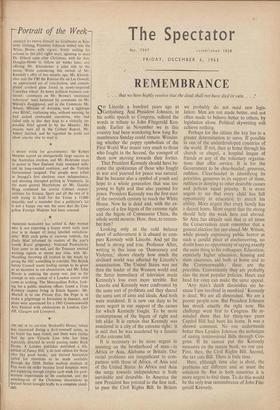REMEMBRANCE
. that we here highly resolve that the dead shall not have died in vain. . .
c o Lincoln a hundred years ago at LI Gettysburg. And President Johnson, in his noble speech to Congress, echoed the words in tribute to John Fitzgerald Ken- nedy. Earlier in November we in this country had been wondering how long Re- membrance Sunday could remain. Wonder- ing whether the poppy symbolism of the First World War meant very much to those who fought in the Second, the youngest of them now moving towards their forties. That President Kennedy should have be- come the spokesman of those who fought in war and yearned for peace was natural.
But he became also a symbol of youth and hope to a whole generation that was too young to fight and that also, yearned for peace. President Kennedy was the first man of the twentieth century to reach the White House. Now he is dead and, with the ex- ception of a few bigots of the extreme right and the bigots of Communist China, the whole world mourns. How, then, to remem- ber him?
Looking only at the cold balance sheet of achievement it is absurd to com- pare Kennedy with Lincoln. And yet the bond is strong and true. Professor Allen, writing in this issue on 'Democracy and Violence,' shows clearly how much the civilised world was affected by Lincoln's assassination. The United States was not then the leader of the Western world and the fierce immediacy of television made Kennedy's loss even more terrible. But Lincoln and Kennedy were confronted by the same sort of problems and they shared the same sort of aims and ideals. And both were murdered. It is now our duty to be more urgent in our support of the causes for which Kennedy fought. To be more contemptuous of the bigots of right and left alike. It is certain that Kennedy was murdered in a city of the extreme right : it is said that he was murdered by a fanatic of the extreme left.
It is necessary to be more urgent in insisting on the brotherhood of man—in Africa or Asia, Alabama or Britain. Our racial problems are insignificant in com- parison with those of Africa, of Asia and of the United States. In Africa and Asia the surge towards independence is both inevitable and desirable. In Am,erica the new President has pointed to the first task, to pass the Civil Rights Bill. In Britain we probably do not .need new legis- lation. Men are not made better, and not often made to behave better to others, by legislation alone. Political skywriting will achieve nothing.
Perhaps for the citizen the key lies in a greater. determination to serve. If possible in one of the underdeveloped countries of the world. If not, then at home through his church or chapel, a hospital league of friends or any of the voluntary organisa- tions that offer service. It is for the Government to be clear-headed, generous, ruthless. Clear-headed in identifying its priorities, generous in, its support of them, ruthless in denying to other desirable causes and 'policies equal priority. It is more urgent to see that every child has full opportunity in education to match his ability. More urgent that every family has a decent home. More urgent that the strong should help the weak here and abroad. Sir Alec has already said that at all times the Conservatives must remember that a general, election lies just ahead. Mr. Wilson, while piously expressing public horror at such a candid piece of electioneering, no doubt loses no opportunity of saying exactly the same thing to his colleagues. Education, especially higher education, housing and slum clearance, aid both at home and to the Commonwealth : these are the priorities. Conveniently they are probably also the most popular policies. Heart and head for once can make the same appeal.
`Any man's death diminishes me be- cause I am involved in mankind.' Kennedy is dead. We are all diminished. We are a poorer people now. But President Johnson has struck exactly the right note. His challenge went first to Congress. He re- minded them that for thirty-two years Capitol, Hill had been his home. It was a shrewd comment. No one understands better than Lyndon Johnson the.technique of easing controversial Bills through Con- gress. If he cannot put the Kennedy measures on the statute book, no one can. First, then, the Civil Rights Bill. Second, the tax cuts Bill. There is little time.
Here, although time also is short, the problems are different and so must the solutions be. But in both countries it is more urgent to find them. To do this would be the only true remembrance of John Fitz- gerald Kennedy.






































 Previous page
Previous page